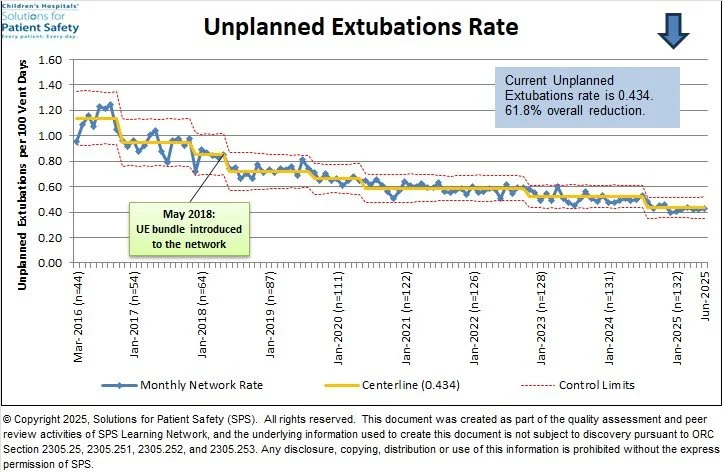
Unplanned Extubations
SPS recognizes the critical need to reduce Unplanned Extubations (UE) in pediatric patients and is committed to advancing UE prevention efforts as part of the Network’s broader patient safety improvement portfolio.
A small cohort of SPS Network hospitals began UE reduction efforts in 2016, and in 2018, an evidence-based prevention bundle was published. Since then, the Network has achieved a 51% reduction in UE events as the prevention bundle has spread across hospitals. However, the work is far from done. UE remains the most frequently occurring serious patient harm in the SPS Network, with approximately 4,000 UE events per year.
To further understand UE trends and guide improvement, 36 SPS hospitals in the UE Pioneer Cohort conducted apparent cause analyses (ACAs) on NICU UE events between June and August 2022. Based on insights from the NICU ACA analysis and expert input, SPS has launched a new UE-NICU improvement cohort with a focus on Proactive Safety Huddles.
By integrating Proactive Safety Huddles into routine practice, hospitals can facilitate intentional risk mitigation by identifying potential UE risks before an event occurs, support individualized patient safety strategies for those at higher risk, and enhance frontline engagement while strengthening leadership’s understanding of UE prevention efforts.
For Network members only
Operational Definition & Bundle
SPS has developed standard definitions for pediatric HACs by leveraging well-established national standards and published literature, tailoring these definitions to provide the necessary context for pediatrics. SPS Network hospitals rapidly adopted these tailored definitions and have collaborated to develop evidence-based bundles in care delivery for each pediatric HAC. The SPS Network is working with hospitals to spread and implement these bundles in care delivery to accelerate the pace of harm reduction.
Additional UE Resources
-
Klugman D, Melton K, Maynord PO, et al. Assessment of an Unplanned Extubation Bundle to Reduce Unplanned Extubations in Critically Ill Neonates, Infants, and Children [published online ahead of print, 2020 Apr 13]. JAMA Pediatr. 2020.

